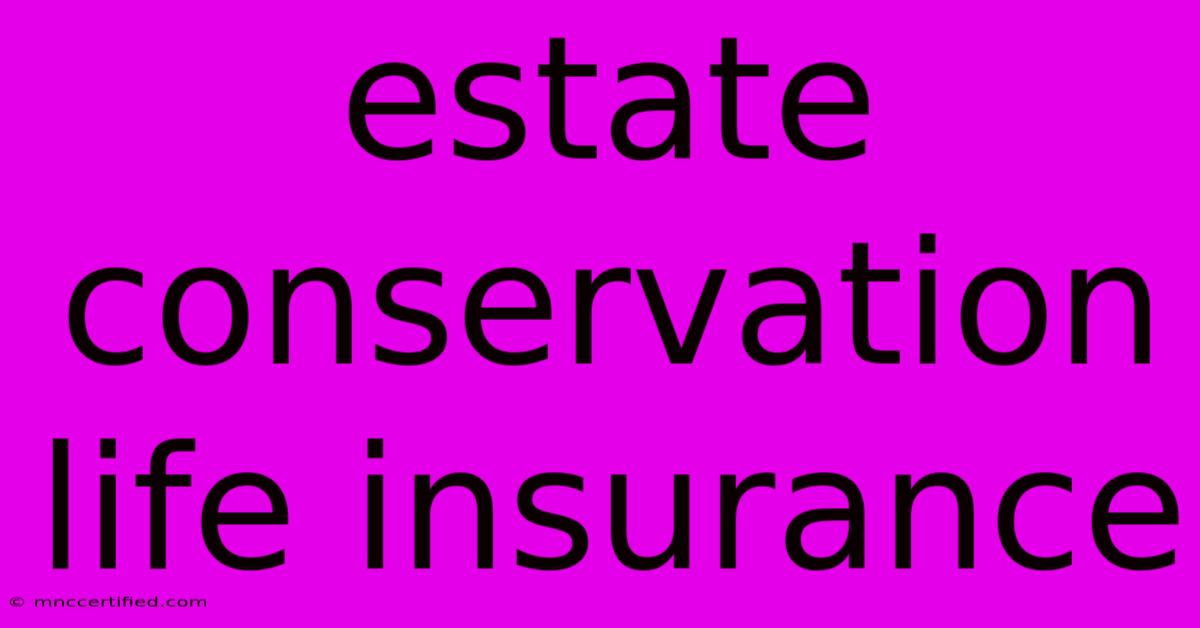Estate Conservation Life Insurance

Table of Contents
Estate Conservation Life Insurance: Protecting Your Legacy
Estate conservation life insurance is a powerful tool for high-net-worth individuals and families seeking to protect and preserve their wealth for future generations. It goes beyond simply providing a death benefit; it strategically addresses estate tax liabilities, minimizes probate costs, and ensures a smooth transfer of assets. Understanding its complexities is crucial for effective wealth management.
What is Estate Conservation Life Insurance?
Estate conservation life insurance, often referred to as estate planning life insurance, uses life insurance policies to strategically minimize the impact of estate taxes and other financial burdens upon death. Unlike traditional life insurance solely focused on providing a death benefit, this approach incorporates sophisticated tax and financial planning strategies. The key is leveraging the tax-advantaged growth of the cash value within the policy to offset estate taxes, thereby preserving a larger portion of the estate for heirs.
Types of Life Insurance Used for Estate Conservation:
Several types of life insurance are suitable for estate conservation, each with its own advantages:
-
Irrevocable Life Insurance Trusts (ILITs): These trusts own and control the life insurance policy, removing it from the insured's estate and preventing it from being subject to estate taxes. This is a highly effective strategy for significant estate values.
-
Second-to-Die Life Insurance: This policy pays out upon the death of the second insured individual. It's particularly effective for couples, providing a lump-sum payment to cover estate taxes and other expenses without immediately depleting assets.
-
Variable Universal Life (VUL) Insurance: VUL policies offer flexibility in investment choices within the cash value component, allowing for growth potential to offset future estate tax liabilities. However, it carries investment risk.
-
Whole Life Insurance: Whole life insurance provides a guaranteed death benefit and cash value growth, offering predictable long-term estate planning. However, it might not offer the same growth potential as VUL.
Key Benefits of Estate Conservation Life Insurance:
-
Estate Tax Mitigation: The most significant benefit is reducing or eliminating estate taxes, preserving a larger share of your wealth for your beneficiaries.
-
Probate Avoidance: Using trusts like ILITs helps avoid the lengthy and often costly probate process, ensuring a faster and more efficient transfer of assets.
-
Liquidity Provision: The death benefit provides immediate liquidity to cover estate taxes, debts, and other expenses, preventing the forced sale of assets.
-
Creditor Protection: Depending on the structure, life insurance benefits may be protected from creditors, safeguarding your family's inheritance.
-
Business Succession Planning: For business owners, estate conservation life insurance can provide the necessary funds for a smooth business transition and prevent disruption.
Choosing the Right Strategy:
Selecting the appropriate estate conservation life insurance strategy requires careful consideration of several factors:
-
Net Worth: Your current net worth dictates the extent of estate tax exposure and the type of policy needed.
-
Risk Tolerance: The choice between VUL and whole life insurance hinges on your comfort level with market fluctuations.
-
Financial Goals: Your long-term financial objectives, including legacy planning and wealth preservation, guide the policy selection.
-
Tax Laws: Estate tax laws are complex and subject to change, necessitating professional guidance.
Working with Professionals:
It's crucial to work with a team of experienced professionals to develop a comprehensive estate conservation plan. This team should include:
- Financial Advisor: To assess your financial situation and recommend appropriate strategies.
- Estate Planning Attorney: To structure the legal aspects of your plan, such as trusts and wills.
- Insurance Agent: To guide you through the selection and purchase of the life insurance policy.
Disclaimer: This article provides general information and should not be considered financial or legal advice. Consult with qualified professionals before making any decisions regarding estate planning or life insurance. The information provided is for educational purposes only.
Optimize Your Search:
This article incorporates various keywords relevant to estate conservation life insurance, including: estate planning life insurance, irrevocable life insurance trusts (ILITs), second-to-die life insurance, variable universal life (VUL) insurance, whole life insurance, estate tax mitigation, probate avoidance, liquidity provision, creditor protection, business succession planning, and high-net-worth individuals. The strategic use of headings, bold text, and a clear structure enhances readability and SEO. Off-page optimization would involve building high-quality backlinks from relevant websites and engaging in social media promotion.

Thank you for visiting our website wich cover about Estate Conservation Life Insurance. We hope the information provided has been useful to you. Feel free to contact us if you have any questions or need further assistance. See you next time and dont miss to bookmark.
Featured Posts
-
Taylor Serrano 2 Date Time Channel
Nov 16, 2024
-
Uefa Nations League World Cup Qualifying
Nov 16, 2024
-
Paraguay Vs Argentina 2026 Wcq Highlights
Nov 16, 2024
-
Billy Bobs Landman Life Review
Nov 16, 2024
-
Disney Shares Hit 6 Month Peak
Nov 16, 2024